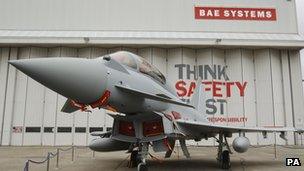Defence firms 'not open about anti-corruption measures'
- Published

Two-thirds of the world's biggest defence companies do not provide enough evidence about how they fight corruption, a pressure group has said.
Transparency International looked at firms from the 10 largest arms exporting nations including the UK, US, Russia, Germany, France and China.
The 129 firms it studied are worth more than $10tn (£6tn) and are responsible for over 90% of global arms sales.
It says corruption in the industry puts "international security at risk".
The study analyses what the biggest defence companies around the world do, or fail to do, to prevent corruption.
Transparency International rates them both on the amount of information publicly available about how they tackle corruption, but also - for the 34 companies who submitted answers - on their internal ethics and compliance methods.
Limited information
The companies - with a combined revenue of more than £300bn - are graded from A to F, with A representing the most extensive evidence of firms' anti-corruption systems.
Only one firm, the American Fluor Corporation, gets an A overall, while the British defence giant, BAE Systems, rates a B in both categories.
The European aerospace company EADS rates a C for the information it makes public on its anti-corruption practices, while British firms Serco group and Qinetiq each get a B in that category.
French company Dassault aviation rates a D, for limited information, while 47 companies from countries ranging from China and Russia to Pakistan rate an F, for putting up little or no evidence of the anti-corruption systems they may have in place.
The Transparency International Defence Companies anti-corruption index 2012 finds that 85% of defence industry leaders are not speaking up enough about the importance of ethics and preventing corruption.
It also says that only 10% of companies have good disclosure of what they do to stop it, although Transparency says that's better than a decade ago.
Secret contracts
Study author Mark Pyman says that one of the reasons the defence industry has been prone to corruption in the past is that so many defence contracts have been secret, with little public pressure brought to bear.
He describes corruption in defence as "dangerous, divisive and wasteful".
"It puts international security at risk, and billions can be wasted in dishonest arms deals," he said.
Former Nato Secretary General Lord Robertson believes that legislation, in the form of the British bribery act, has helped to galvanize defence companies to act to tackle corruption.
Commenting on the index, he says companies "must have a reputation for zero tolerance to corruption."
He said: "By having the right anti-corruption systems in place, companies can avoid a drop in stock prices, blacklists, and even prison.
"It is in their interest to take action, and this index provides the guidance to do so."
Transparency International hopes that its defence companies' anti-corruption index will encourage good practice, and raise standards globally.
- Published1 October 2012
- Published11 July 2012